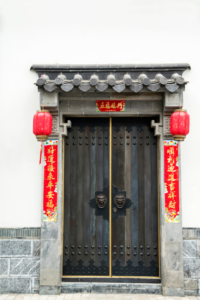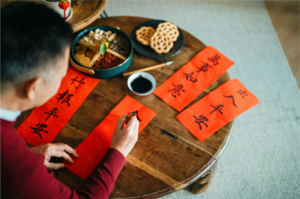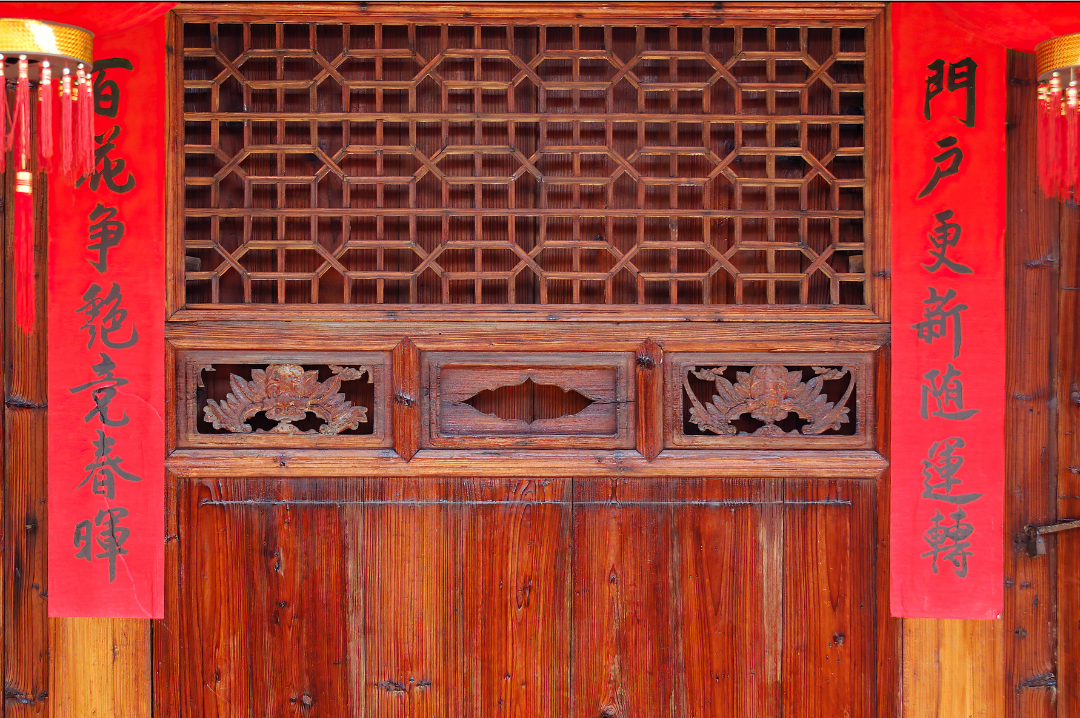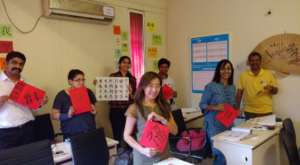As the Lunar New Year approaches, streets across China burst with vibrant red decorations, echoing the joyous spirit of the Spring Festival. Among these traditional adornments, one iconic feature stands out: the Spring Festival couplets. These poetic expressions, meticulously crafted and displayed with pride, symbolize the hopes and aspirations of millions for the coming year.
 Traditionally, Spring Festival couplets consist of two vertical lines of poetry flanking the entrance, complemented by a horizontal scroll above the doorway. These elegant compositions, adorned with black or golden characters on scarlet paper, embody the festive spirit and wishes for prosperity in the year ahead.
Traditionally, Spring Festival couplets consist of two vertical lines of poetry flanking the entrance, complemented by a horizontal scroll above the doorway. These elegant compositions, adorned with black or golden characters on scarlet paper, embody the festive spirit and wishes for prosperity in the year ahead.
The art of crafting Spring Festival couplets is steeped in tradition and poetic finesse. Each line must contain an equal number of characters, with meanings that are related yet antithetical. This intricate balance requires verbal dexterity akin to composing a Japanese “Haiku”, a Hindi “Doha”, an Urdu “Sher”, a “Choupai”, “Vak” or even a Marathi “Ukhanaa”.
Historically, these couplets were written in vertical lines from right to left, adhering to the conventions of classical Chinese writing.

In bygone eras, families diligently penned their own couplets, imbuing them with personal sentiments and artistic flair. However, with the passage of time, this practice has waned. Nowadays, convenience often trumps tradition, and many opt to purchase pre-made couplets from stores.
Yet, amidst the modernization of customs, a new phenomenon has emerged: AI Spring Festival couplets. Technology has infiltrated this ancient tradition, courtesy of innovations by China’s leading search engine, Baidu. With the aid of artificial intelligence, individuals can input their desired characters, and the AI engine generates multiple couplets. This blend of tradition and technology has sparked excitement, offering a novel way to engage with age-old customs.

Moreover, the digital age has revolutionized another cherished New Year tradition: the exchange of red envelopes filled with money. With the rise of electronic payment apps like Alipay and WeChat Pay, gifting money has become as simple as a click. Paper envelopes are making way; for electronic hongbao, heralding a new era of convenience and efficiency.
Despite these modern transformations, the essence of Chinese New Year endures. It remains a time for families to reunite, share laughter, and create cherished memories. As we embrace the evolution of customs and traditions, let us not forget the timeless values of love, unity, and gratitude that define this auspicious occasion.
During our classes at The Oriental Dialogue, Pune, students eagerly participated in crafting their own “福” (fú) characters, each stroke infused with hopes for prosperity and happiness in the coming year. With brushes in hand and hearts full of anticipation, they meticulously wrote the characters, embodying the spirit of the season.
In closing, I extend my warmest wishes to all for a joyous and prosperous Chinese New Year! May the Year of the Dragon bring abundance, happiness, and fulfillment to each and every one of you. Happy Chinese New Year!
Some Traditional Spring Festival Couplets for the Year of the Dragon that you can make:
- 龙腾虎跃庆新春,岁岁年年乐无穷。 (Lóng téng hǔ yuè qìng xīnchūn, suì suì nián nián lè wúqióng.) Translation: Dragons soar and tigers leap to celebrate the New Year, bringing endless joy year after year.
- 龙腾虎跃迎春到,福祥康乐又一年。 (Lóng téng hǔ yuè yíng chūn dào, fú xiáng kāng lè yòu yī nián.) Translation: Dragons soar and tigers leap to welcome spring, bringing prosperity and happiness for another year.
- 金龙献瑞迎春来,福祥满堂庆团圆。 (Jīn lóng xiàn ruì yíng chūn lái, fú xiáng mǎn táng qìng tuányuán.) Translation: The golden dragon brings blessings as spring arrives, bringing happiness and unity to the entire family.
- 春风得意龙凤舞,福禄齐天庆岁时。 (Chūn fēng dé yì lóng fèng wǔ, fú lù qí tiān qìng suì shí.) Translation: Spring breeze brings joy as dragons and phoenixes dance, bringing fortune and blessings throughout the year.
- 金龙呈祥喜迎春,辞旧迎新贺岁新。 (Jīn lóng chéng xiáng xǐ yíng chūn, cí jiù yíng xīn hè suì xīn.) Translation: The golden dragon brings auspiciousness, joyfully welcoming spring, bidding farewell to the old and welcoming the new year.





